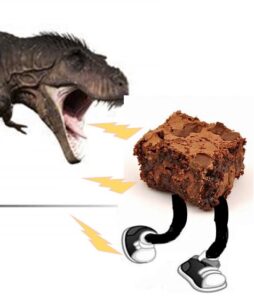Chapter 6 brings up some heavy ethical questions, in a light manner. First, is it OK to eat animals? Why is it OK to eat pigs, but not horses (we won’t even delve into man’s best friend). Lions and alligators don’t know any better, but we know how to stay healthy without eating flesh.
The Air Force now says they have recorded UFO’s – which may be aliens – or perhaps Dr. Strangelove. But, what if they are aliens and they operate at a different level than us – we are inferior creatures – and they find us delicious? I don’t think we’d be OK with them hunting us, bringing us back to Alpha Centauri and putting us in zoos, making us slaves or eating us. Would finding out that we aren’t the supreme animals in the universe change our morals – or our eating habits?
The second ethical issue is if the ends justifies the means. It is very easy to say no when it doesn’t touch you personally, or if it is an issue of little consequence. The classic example is using the results of the medical tests the Nazi’s performed on prisoners, including children. As heinous as the acts, is it evil to use the knowledge? How about if it could save the life of a child – or someone you love? How many people would not open up that book to find the answer? I am sure there are some people out there who would be unwilling to do so. Those people are saints. I would be willing to be the rest of us would compromise our values. Many advanced we now use came from the Nazi’s and their human experiments: chloroquine, methadone, some insecticides. And, we in the USA have conducted experiments on humans without their knowledge. Should we not use this information? John Hayward used Nazi data in his work on hypothermia and said “I’ve rationalized it a little bit. But to not use it would be equally bad.” For an interesting discussion, see the BBC article, “Is it right to use Nazi research if it can save lives?

